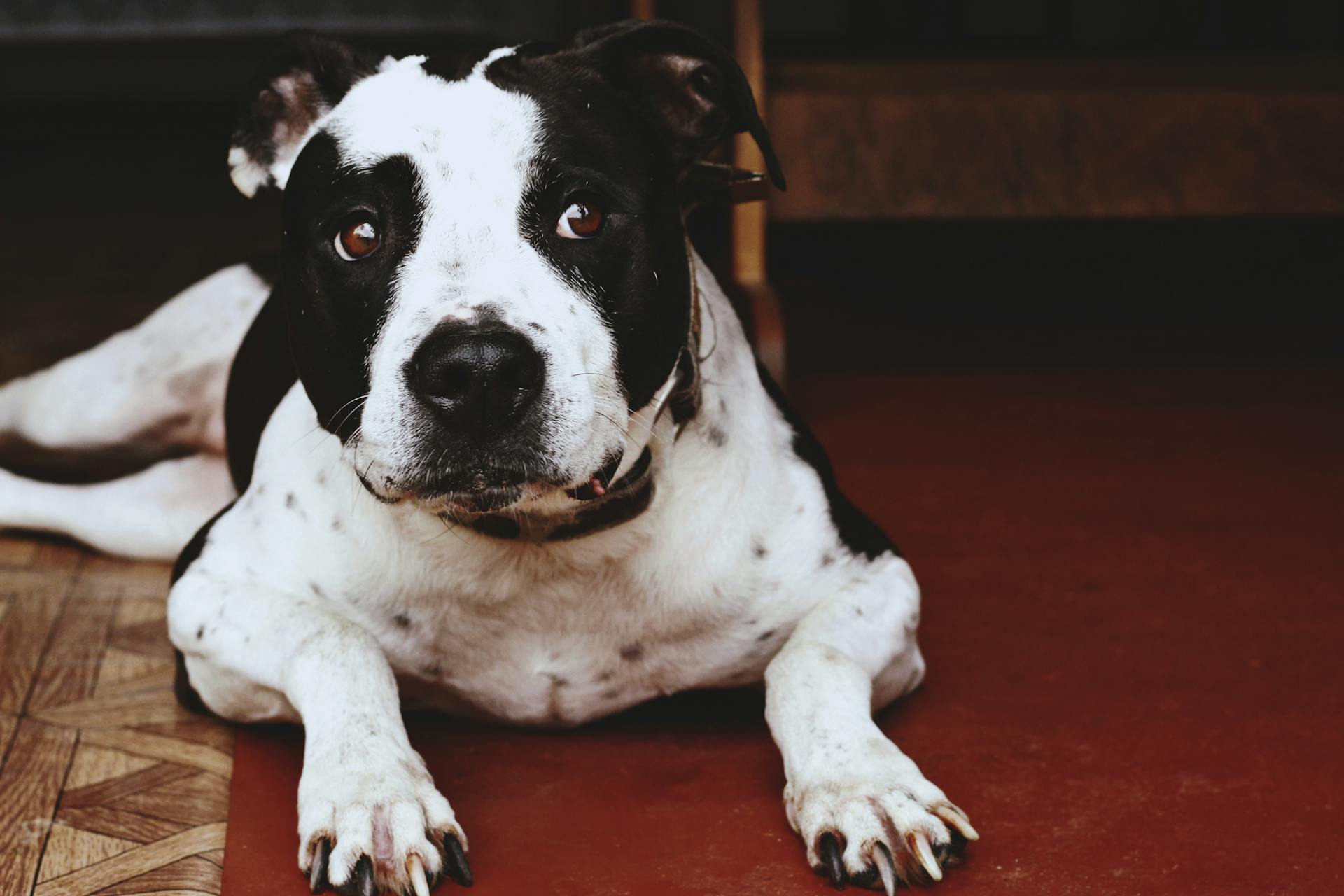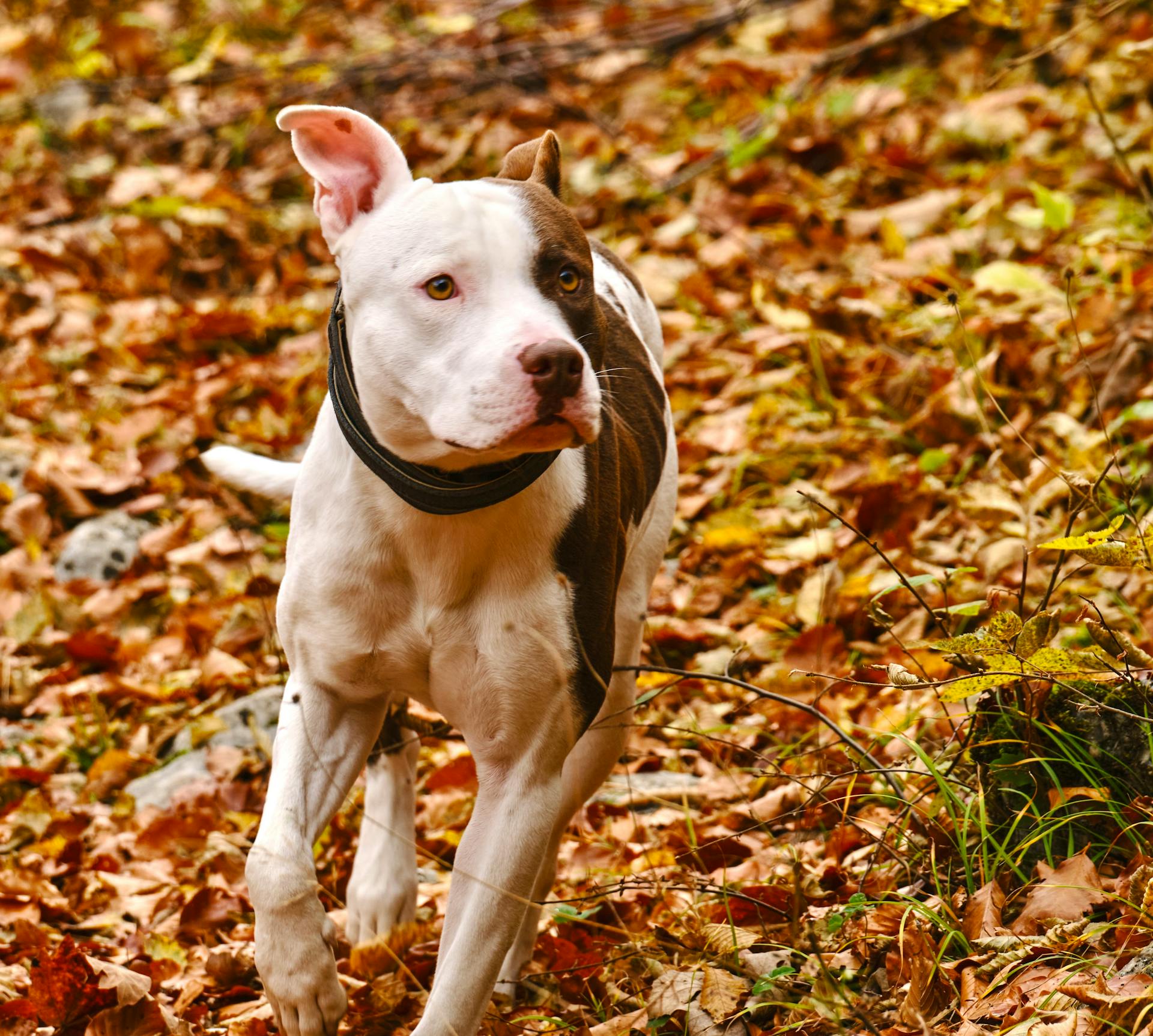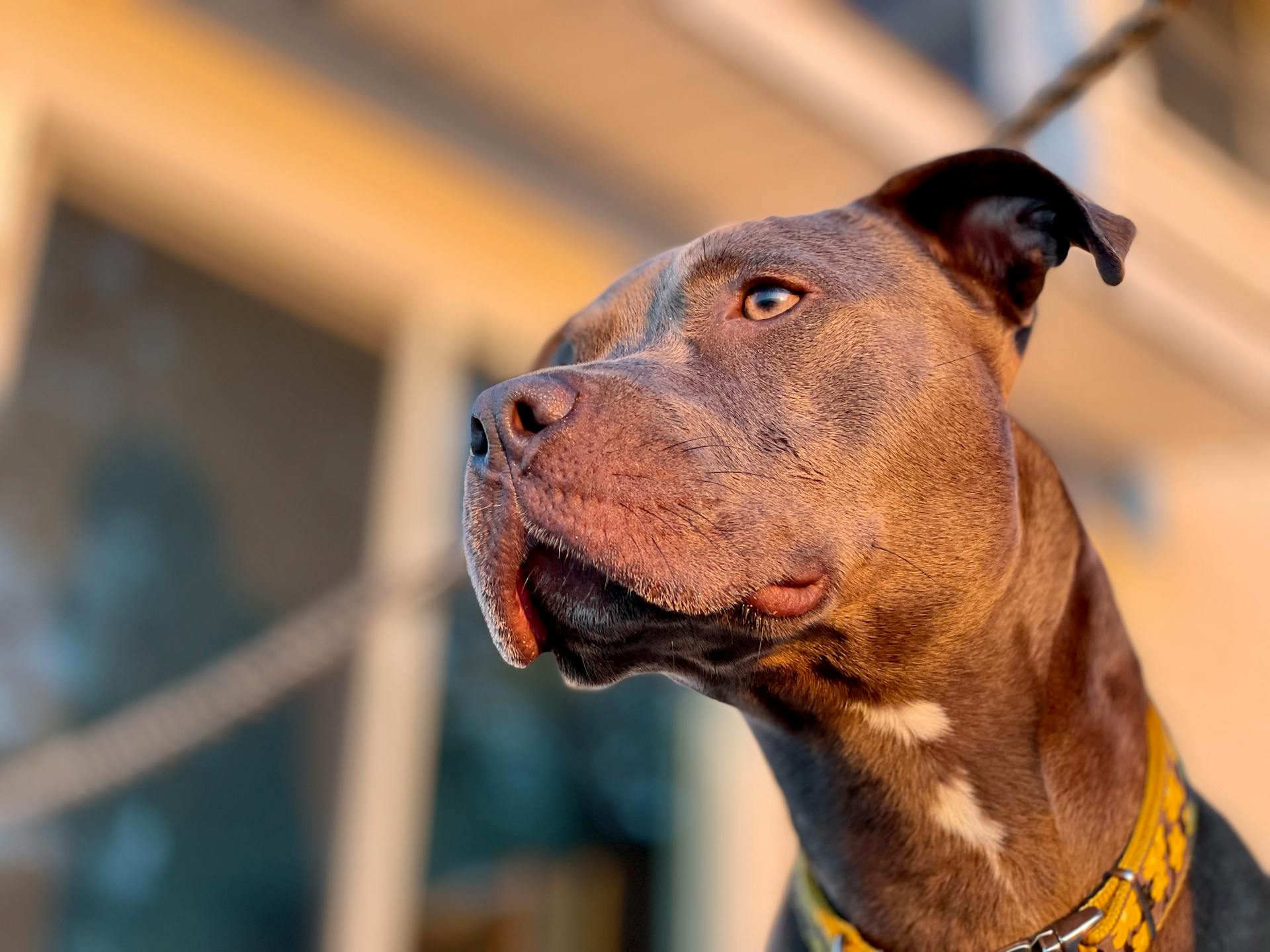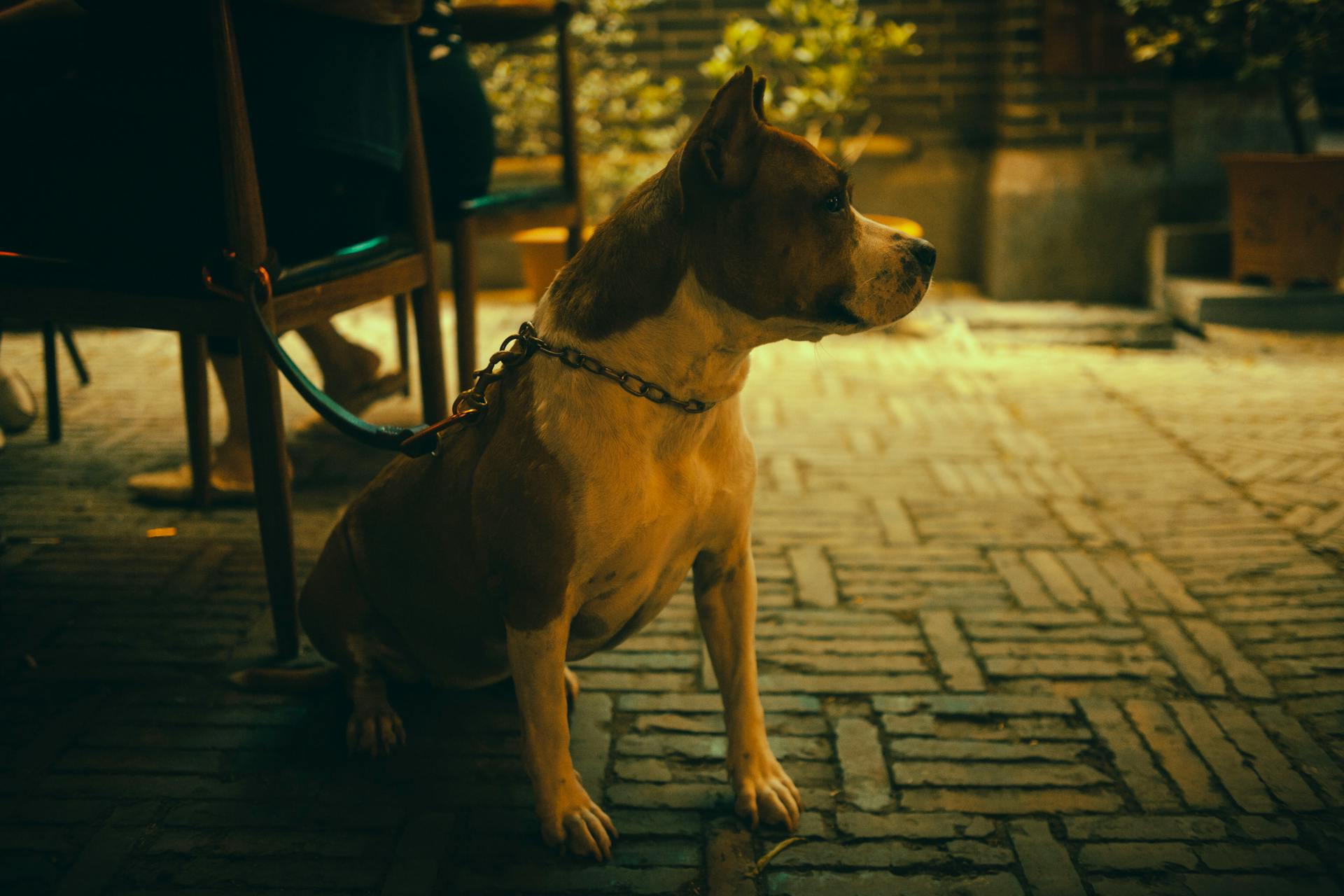
Pit bulls have a bad rap, but the truth is, they're some of the friendliest dogs you'll ever meet. In fact, studies have shown that pit bulls are one of the breeds most likely to be adopted from shelters.
Their loving nature makes them a great fit for families with children. According to the American Temperament Test Society, pit bulls have a passing rate of 86.8%, which is higher than many other popular breeds.
Many people assume pit bulls are aggressive due to their history in dog fighting, but this isn't an accurate representation of the breed as a whole. In reality, the vast majority of pit bulls are loving companions.
Pitbull Breed
The term "Pitbull" is often misunderstood, and it's not a breed or official term, but rather a word used to describe dogs with a certain physical appearance.
A medium-sized, muscular body is one of the physical traits associated with dogs described as Pitbulls.
Dogs referred to as Pitbulls can have almond-shaped, deep-set eyes, floppy ears, a short, smooth coat, and a long, slim tail.
The American Staffordshire Terrier, Staffordshire Bull Terrier, and the American Pit Bull Terrier are some recognized breeds that are sometimes referred to as Pitbulls.
Suggestion: Are Bully Dogs Pit Bulls
Pitbull Behavior and Temperament
Pitbulls have a reputation for being "inherently aggressive", but this is a misconception. The media often lumps all Pitbull types into one category, the "dangerous dog" category, but this is not accurate.
Each Pitbull is an individual dog with its own unique personality and temperament. Socialization, past experiences, and genetics can all play a role in determining how a dog behaves and interacts with people and other dogs. A well-socialized Pitbull is likely to be a non-aggressive, friendly, and fun-loving companion.
Here are some key factors to consider when evaluating a Pitbull's temperament:
- How well does the dog get along with people in general?
- Does this dog get along well with other dogs and pets?
- Is the dog known for being good with children?
- How does this dog react to strangers?
- What is the dog's personality like?
By asking these questions and spending time with the dog, you can get a clearer picture of whether or not you'd be a good fit for each other.
Aggression in Pitbull Mixes
Pitbulls have a reputation for being "inherently aggressive", but this is a misconception.
The media often lumps all Pitbull types into one category—the “dangerous dog” category, but this is unfair.
Many organizations, including the ASPCA, attest to the importance of viewing each Pitbull as an individual dog.
You will be most successful at finding your perfect match by viewing each dog as an individual, as explained by Samantha Nelson, policy specialist for companion animals at the Humane Society of the United States.
A Pitbull that has been well-socialized around people and dogs is likely to be a non-aggressive, friendly, and fun-loving companion.
Socialization, past experiences, and genetics can all play a role in determining how a dog behaves and interacts with people and other dogs.
A well-socialized, trained, and properly cared for Pitbull-Lab mix is likely to be a fantastic companion, as both Pitbulls and Labradors are often friendly and loving dogs.
Discover more: Are Pit Bulls Hypoallergenic Dogs
Socialization and a Dog's Temperament
Socialization is a crucial factor in determining a dog's temperament. It's not just about exposing your dog to new experiences, but also about teaching them good behavior and helping them associate positive experiences with new situations.
Proper socialization can prevent anxiety, fear, and aggression in dogs. Without it, they may become fearful or aggressive towards other animals and people.
Start socializing your pup as early as possible, between 3 and 14 weeks of age, when they are more receptive to new experiences. This is a critical period for socialization.
Positive reinforcement techniques, such as treats, praise, and play, can encourage good behavior and help your dog associate positive experiences with new situations.
Gradual exposure to new experiences is key. Start with less overwhelming situations and progress to more challenging ones as your dog becomes more comfortable.
Varied environments can help socialize your dog. Take them on walks in different neighborhoods, introduce them to other dogs at the park, and visit pet stores and public places with your pup.
Obedience training is essential for teaching your dog necessary skills, like walking on a leash, sitting, staying, and coming when called. Consistency is the key to successful socialization.
Here are some steps to socialize your Pitbull properly:
- Start Early: Socialize your pup between 3 and 14 weeks of age.
- Positive Reinforcement: Use treats, praise, and play to encourage good behavior.
- Gradual Exposure: Introduce your dog to new experiences gradually.
- Varied Environments: Take your dog on walks in different neighborhoods and introduce them to other dogs.
- Obedience Training: Enroll your pup in obedience training classes.
- Consistency: Socialize and reinforce positive behavior regularly.
Community and Education
Educating yourself about pit bull-type dogs is a great place to start making a difference in your community. Best Friends Animal Society and the ASPCA offer robust resources from reputable studies and outlets.
In July 2023, the City of Tacoma passed new rental housing legislation prohibiting landlords from enforcing breed restrictions. This is a significant step forward for pet-inclusive housing.
Did you know that in 2022, the Humane Society for Tacoma & Pierce County cared for 747 pit bull-type dogs, making up more than a quarter of the total dogs they cared for that year?
Adopting, fostering, or volunteering at the shelter are ways you can directly impact the lives of pit bull-type dogs. Your love, care, and companionship make a world of difference for these dogs.
Attending local events, like adoption fairs or pit bull meetups, can help spread the word about responsible ownership and proper training techniques. This is a great way to engage with others and promote positive change.
A fresh viewpoint: Do Pit Bulls Attack More than Other Dogs
Unfortunately, most shelters don't mention if a dog is a pit mix because they're afraid they won't be adopted. This is a heartbreaking reality that we can help change by advocating for these dogs.
By showing off your adorable pit bull on social media, using the hashtag #pitbulllove, you can bring awareness and support to the cause. Let's show the world that pit bulls are deserving of our love and advocacy.
Pitbull Ownership and Benefits
Pitbull ownership is a wonderful experience, and it's great to see so many people embracing these loving dogs as part of their families. Rena Lafaille, director of administration and promotions for the New York ASPCA Adoption Center, notes that most adopted Pit Bull-type dogs are living peacefully with their families.
Pitbulls are known for their loyalty and affection, making them a great fit for families with children. They are also popular family pets, as Rena Lafaille explains. Samantha Nelson, a policy specialist for companion animals at the Humane Society of the United States, adds that there are millions of Pit Bull dogs who live happily with their families without incident.
One of the best things about Pitbulls is their ability to provide unconditional love and affection. They don't judge you, and they're always happy to see you come home. This is just one of the many benefits of owning a Pitbull, as outlined in the article.
Here are some of the benefits of Pitbull ownership:
- Unconditional love and affection
- Reduced stress levels through exercise and playtime
- Companionship and social support
- Security and protection
- Positive impact on kids and the elderly
- Fun activities to do together, like going for walks or playing fetch
- Improved mental health through regular interaction
These benefits are backed up by studies that show petting dogs releases endorphins, which help reduce anxiety and depression. So, if you're thinking of bringing a Pitbull into your family, you can be sure you're making a great decision!
History and Awareness
Friendly pit bulls have a long and complex history, with evidence of their existence dating back to the 19th century in England.
Their origins are often misunderstood, but it's clear that they were initially bred as companions and working dogs, not as fighting machines.
Pit bulls were a popular breed in the early 20th century, often kept as family pets and participating in dog sports like agility and obedience.
A fresh viewpoint: How Often Do Pit Bulls Attack
Their friendly nature was a hallmark of the breed, with many owners and trainers praising their affectionate and outgoing personalities.
However, a series of unfortunate events, including media portrayals and irresponsible breeding, led to a decline in their popularity and a rise in negative stereotypes.
Today, many people are working to raise awareness about the friendly pit bull and dispel common myths about the breed.
A different take: What Is the Largest Breed of Pit Bulls
The History of
History of awareness about mental health dates back to ancient civilizations, with evidence of mental health discussions in ancient Egyptian and Greek texts.
The concept of self-awareness has been around for thousands of years, with philosophers like Socrates and Plato exploring the idea of introspection and personal growth.
In the 19th century, the understanding of mental health disorders began to take shape, with the introduction of terms like "neurasthenia" to describe anxiety and fatigue.
The first mental health awareness campaigns emerged in the 1950s, with organizations like the National Alliance on Mental Illness (NAMI) advocating for greater understanding and acceptance.

Historically, mental health awareness has been closely tied to social and cultural movements, with the civil rights movement and feminist movement playing significant roles in shaping public perceptions of mental health.
The introduction of the Diagnostic and Statistical Manual of Mental Disorders (DSM) in 1952 marked a significant shift in the way mental health professionals understood and diagnosed mental health conditions.
A growing body of research has highlighted the importance of mental health awareness in preventing and treating mental health disorders, with studies showing that early intervention can significantly improve outcomes.
National Awareness Day Celebration
To celebrate National Pit Bull Awareness Day, you can start by posting a photo of your pit bull on social media and tagging @wagsandwalks. This helps show your community just how lovable pits are.
You can also help by filling out a foster application today. The more fosters we have, the more pit bull lives we can save.
Another way to participate is by adopting a pit bull. You can start by filling out an adoption application on the Wags & Walks website.
Making a donation to Wags & Walks in honor of a special pit bull in your life is also a great way to celebrate.
Frequently Asked Questions
Which pitbull is most friendly?
The Red Nose Pitbull is known for being one of the friendliest pitbull breeds when properly raised and trained. With love, care, and responsible ownership, they can make excellent additions to families and households.
What states do not allow pit bulls?
There are no US states that ban Pit Bulls entirely, but some cities have breed bans that restrict their ownership. Check local laws for specific information on Pit Bull regulations.
Sources
- https://www.thehumanesociety.org/debunking-pit-bull-myths/
- https://love-a-bull.org/resources/the-history-of-pit-bulls/
- https://www.dogster.com/lifestyle/are-pitbull-mixes-dangerous
- https://www.lifewithdogs.tv/are-pit-bulls-dangerous/
- https://www.wagsandwalks.org/blog-la/national-pitbull-awareness-day-2020
Featured Images: pexels.com


